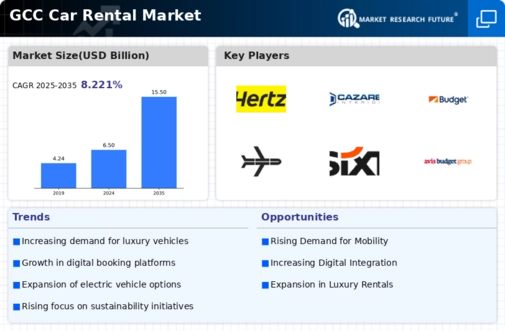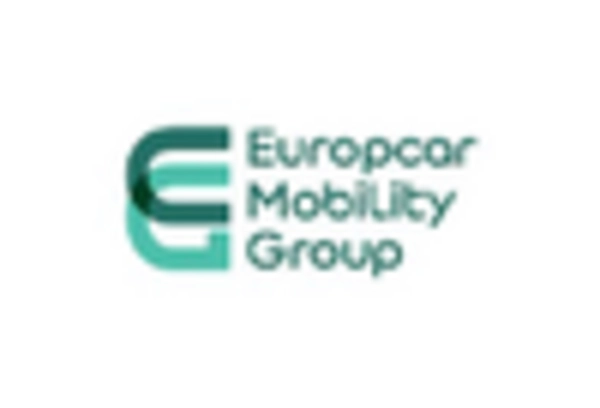Increased Focus on Customer Experience
In the car rental market, enhancing customer experience has become a pivotal driver of growth. Companies are increasingly investing in personalized services, loyalty programs, and seamless booking processes to attract and retain customers. In the GCC, where competition is intensifying, providing exceptional customer service can differentiate rental companies. Research indicates that 70% of consumers are willing to pay more for a better experience, suggesting that companies prioritizing customer satisfaction may see higher revenues. Additionally, the integration of customer feedback mechanisms allows companies to adapt their offerings based on consumer preferences, further solidifying their position in the car rental market.
Rising Urbanization and Mobility Needs
Urbanization in the GCC is driving a surge in mobility needs, significantly impacting the car rental market. As cities expand and populations grow, the demand for flexible transportation solutions increases. The urban population in the GCC is expected to reach 90% by 2030, leading to a heightened need for car rentals among residents and tourists alike. This trend suggests that rental services will become essential for daily commuting and leisure travel. Additionally, the rise of shared mobility services complements traditional rentals, creating a more dynamic market landscape. Companies that adapt to these urban mobility trends may find substantial growth opportunities in the car rental market.
Regulatory Changes and Environmental Standards
The car rental market is currently navigating a landscape shaped by evolving regulatory changes and environmental standards. Governments in the GCC are increasingly implementing policies aimed at reducing carbon emissions and promoting sustainable practices. For instance, regulations mandating the use of low-emission vehicles are becoming more prevalent. This shift is likely to compel rental companies to adapt their fleets accordingly, potentially leading to a 25% increase in the adoption of electric and hybrid vehicles by 2030. Such regulatory changes not only impact operational costs but also influence consumer preferences, as environmentally conscious customers may favor rental services that align with their values. This trend indicates a transformative phase for the car rental market.
Technological Advancements in Fleet Management
The car rental market is experiencing a notable shift due to advancements in fleet management technologies. Innovations such as telematics and real-time tracking systems enhance operational efficiency and customer satisfaction. These technologies allow rental companies to monitor vehicle performance, optimize maintenance schedules, and reduce downtime. In the GCC, the integration of such technologies is projected to increase operational efficiency by approximately 20%. Furthermore, the adoption of mobile applications for booking and customer service is transforming user experiences, making rentals more accessible and convenient. As a result, companies that leverage these technological advancements are likely to gain a competitive edge in the car rental market.
Economic Diversification and Increased Disposable Income
The GCC's ongoing economic diversification efforts are positively influencing the car rental market. As countries in the region shift away from oil dependency, new sectors such as tourism, technology, and finance are emerging. This diversification is expected to boost disposable incomes, leading to increased consumer spending on services, including car rentals. For instance, the average disposable income in the GCC is projected to rise by 15% over the next five years. Consequently, more individuals are likely to opt for rental services for both business and leisure purposes. This trend indicates a promising outlook for the car rental market as it aligns with the region's economic growth.

















